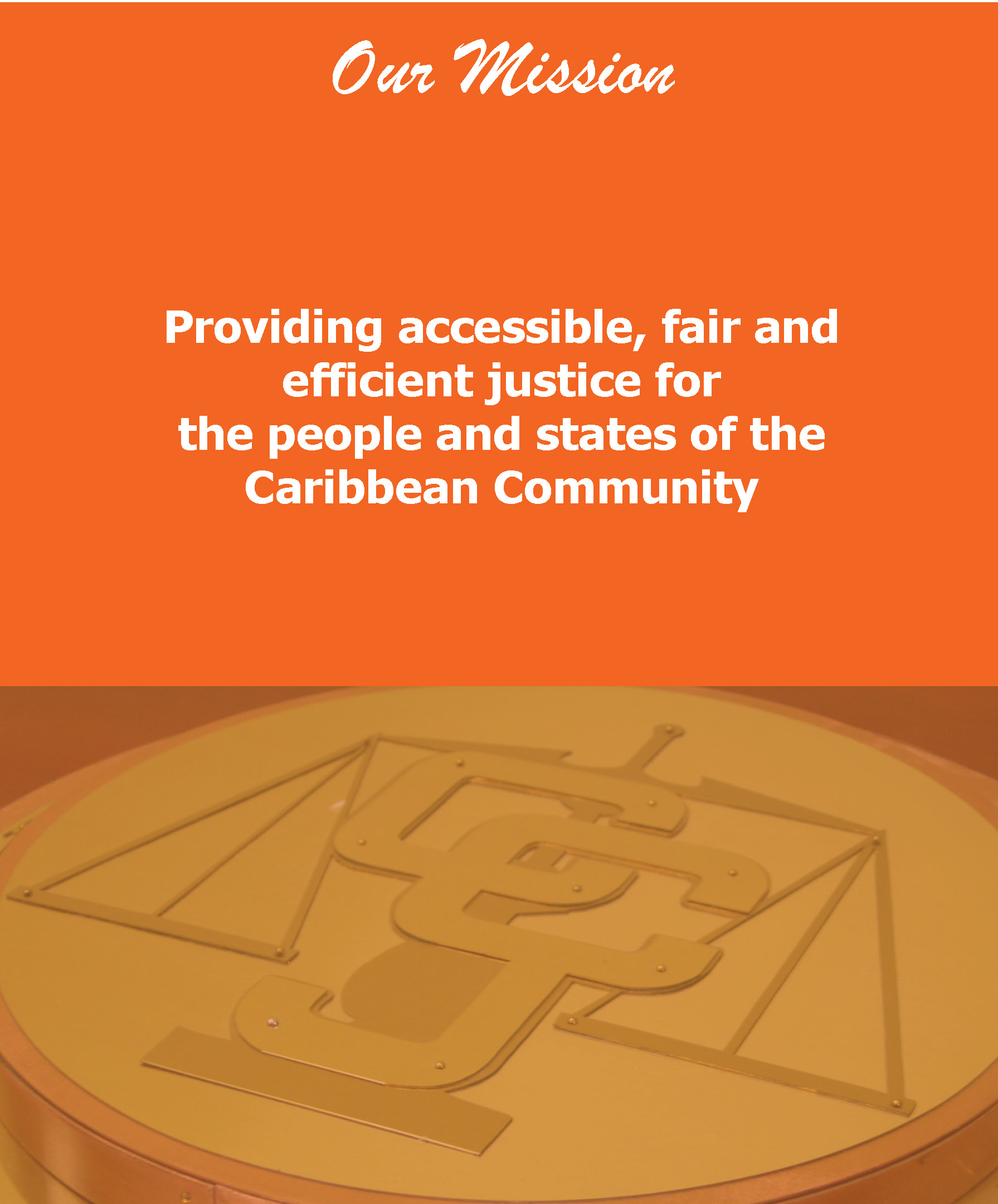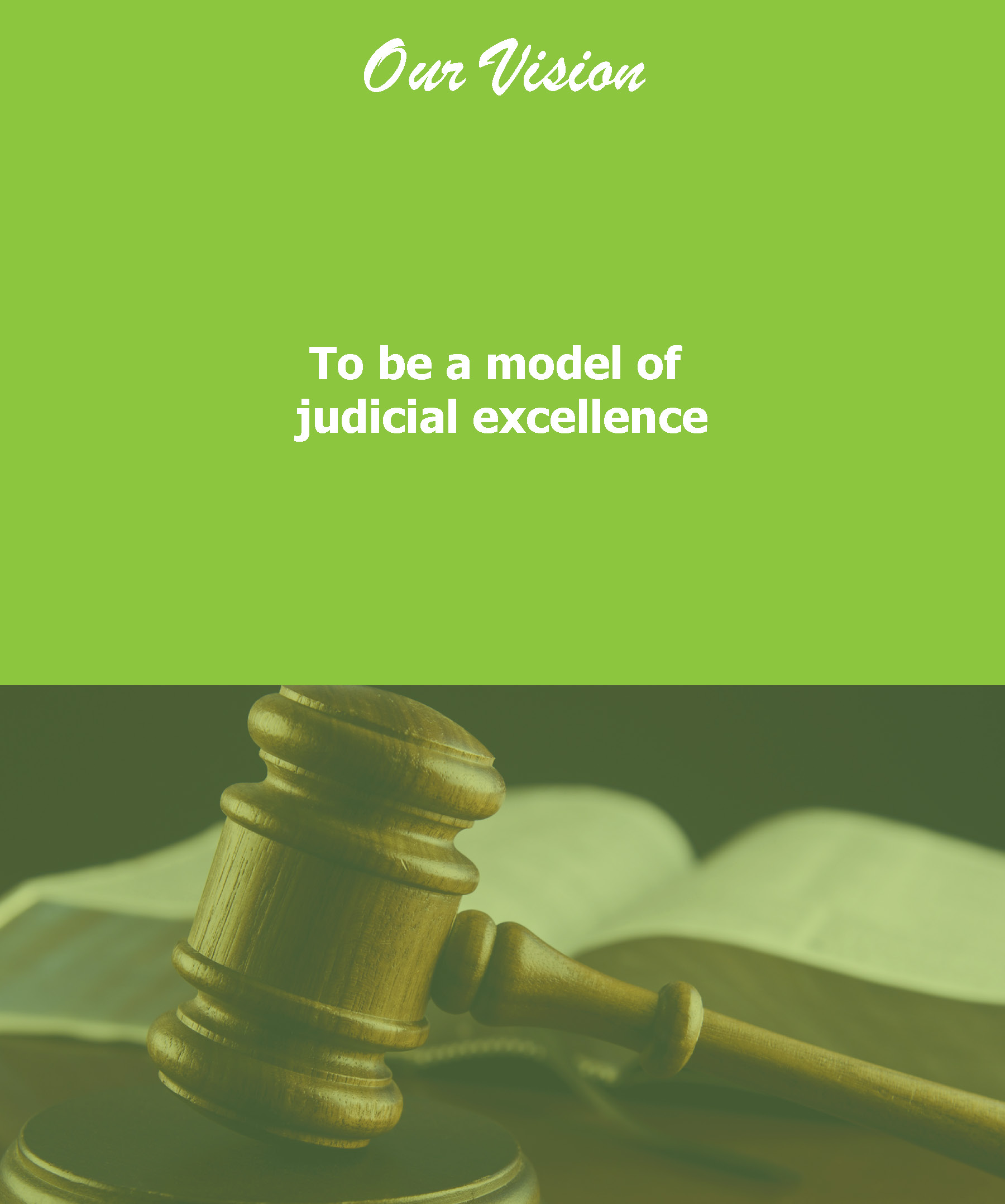Mission, Vision and Values



History
Scroll to left for more information
Timeline and Jurisdiction
The Court has two jurisdictions, an Appellate Jurisdiction and an Original Jurisdiction. In its Appellate Jurisdiction, the Court serves as the final court of appeal in civil and criminal matters for those countries of the Caribbean Community which are parties to the Agreement and have acceded to the appellate jurisdiction. In its Original Jurisdiction the Court is a court of first instance which applies rules of international law in respect of the interpretation and application of the Revised Treaty of Chaguaramas.
At present the Court receives cases in its Appellate Jurisdiction from Barbados, Belize, Dominica, Guyana and Saint Lucia. In the Original Jurisdiction, the Court receives cases from the twelve Contracting Parties to the Agreement Establishing the Court. Decisions of the CCJ in both its Appellate Jurisdiction and its Original Jurisdiction are final.
Our judgments, our scales of fees and our Rules of Court, with provisions for poor persons to access the CCJ without fees and security for costs, (e.g. Ross v Sinclair [2008] CCJ 4 (AJ)) have provided accessibility to timely justice for all. Indeed, where possible in applications for special leave to appeal to the CCJ, we have been prepared (with advance notice to parties) to treat an application as the hearing of the substantive appeal.
We have put fairness at the heart of our judgments. Thus in A-G of Barbados v Joseph and Boyce [2006] CCJ 3 the Government was held to the legitimate expectation it had created in two convicted murders that their sentence of death would not be carried out until the Barbados mercy committee, deciding whether or not to commute the death sentences to life imprisonment, had received and considered a clemency report from the Inter-American Commission on Human Rights. We have also determined that time spent on remand must normally be fully credited when sentencing convicted criminals (R v Da Costa Hall [2011] CCJ 6 (AJ)). Moreover, in Gibson v A-G of Barbados [2010] CCJ 3 (AJ) to ensure the penurious accused’s right to a fair trial, his trial was stayed to allow time for the State to provide him with a reasonable sum of money to cover the fees of a forensic odontologist to counter the State’s odontologist in determining whether or not the teeth marks on the victim’s body were his, this being the only evidence capable of incriminating him. If the money for this key expert was not forthcoming the trial would be permanently stayed and the charge dismissed.
Where civil law is concerned we have (in Zuniga v A-G of Belize [2014] CCJ 2 (AJ) struck down legislation that was unconstitutional for imposing a mandatory minimum punishment of five years for any contempt of court flowing from breach of a court order. In support of the fair rule of law we also held void (in BCB Holdings Ltd v A-G of Belize ([2013] CCJ 5 (AJ)) the Government’s executive action, without any Parliamentary legislation, to grant a foreign company a uniquely beneficial tax regime independent of Belize tax laws. Moreover, we have held in Marin v A-G of Belize [2011] CCJ 9 (AJ) that, just as there is a criminal offence of misfeasance in public office that applies to public office holders, like Government Ministers, so there is a civil liability for damages flowing from misfeasance in public office.
In Guyana where Roman-Dutch law applies to land but, otherwise, English common law applies as affected by Guyanese legislation, we have held that no equitable property interests in land can subsist e.g. to protect the rights of occupying contractual purchasers against third parties to whom the owner transferred title. Nevertheless, fair protection has been provided to such purchasers, taking account of developments in modern South African Roman-Dutch law: see Ramkishun v Fung-Fee-Fung [2010] CCJ 2 (AJ). The prescriptive rights of adverse possessors of land have also been developed and clarified: see Toolsie Persaud Ltd v Andrew James Investments Ltd [2008] CCJ 5(AJ) and Ramlagan v Singh [2015] CCJ 7(AJ).
Judgments have also supported modern commercial practices (in LOP Investments Ltd v Demerara Bank Ltd [2009] CCJ 10(AJ) and Atlantic Corporation Ltd v Development Finance Corporation [2012] CCJ 6 (AJ)) and helped to clarify conveyancing law in Barbados in Hope v Rodney [2009] CCJ 12(AJ), Colby v Felix Enterprises Ltd [2011] CCJ 10(AJ) and Sea Havens Inc v Dryud [2011] CCJ 13(AJ).
In our original jurisdiction we have put flesh on the bones of the Revised Treaty of Chaguaramas. Individuals or companies of a State can use the Treaty to make their own State, as well as other CARICOM States, comply with the Treaty: Trinidad Cement Ltd v Republic of Guyana (2009] CCJ 1 (OJ). States can be ordered to implement and maintain the common external tariff (Trinidad Cement Ltd v Republic of Guyana (No 2) [2009] CCJ 5 (OJ)) and to pay compensation for breaches of the Treaty: Myrie v State of Barbados (No 2) [2013] CCJ 3 (OJ) and Rudisa Beverages NV v Republic of Guyana [2014] CCJ 1 (OJ). The Secretary General of CARICOM and the Council for Trade and Economic Development are subject to judicial review by the CCJ (Trinidad Cement Ltd v Caribbean Community [2009] CCJ 4 (OJ)) and decisions of the Conference of Heads of Government are as much binding law as is the Treaty. Hence it was established in Myrie (No 2) v State of Barbados [2013] CCJ 3 (OJ) that CARICOM nationals have a right to move freely between States and be granted a stay of six months in other CARICOM States unless it is shown that they are likely to be a charge on public funds or are undesirable in a restricted sense. Moreover, persons cannot be denied entry to Belize or Trinidad by reason only of their homosexual orientation: Tomlinson v State of Belize and State of Trinidad & Tobago [2016] CCJ 1 (AJ).
